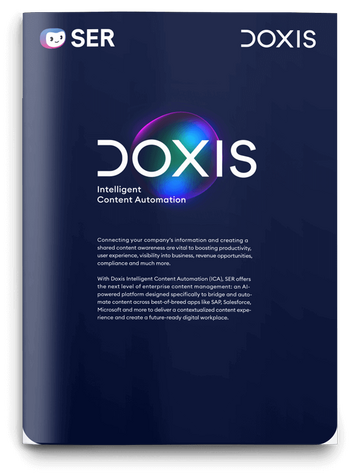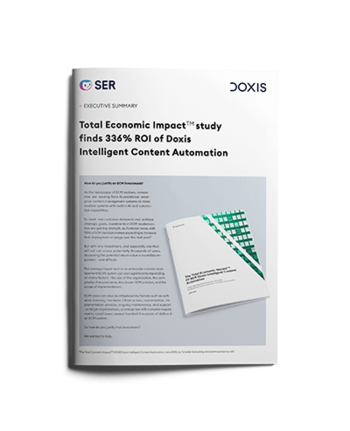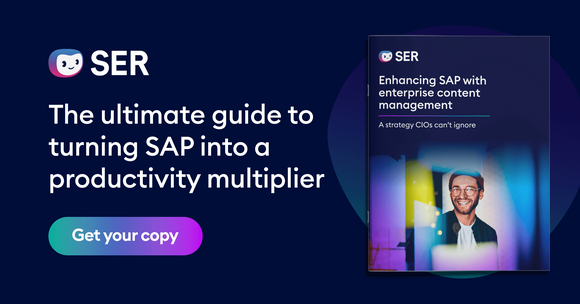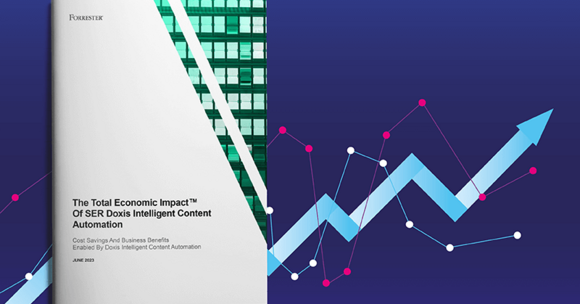SER Blog Customer Stories & Use Cases
Hand-in-hand: AI and ECM systems lead the new work revolution
Open innovation, sharing culture, work-life blending, freelancing, 6-hour day and 4-day week – all these concepts have something in common: they are part of the new work model. New work, or work 4.0, represents a paradigm shift in how we think about work. In a knowledge and information society, the focus of work is on people.
Technology leads the way and makes the new work model possible in the first place. Read more to learn how ECM systems and AI can help you create the conditions for new work.

What is new work?
By definition, “new work” stands for a fundamental change in the world of work. Based on megatrends such as digitalization, globalization, and demographic shifts, traditional work concepts are considered outdated. Work is no longer a means to an end. Instead, people see a higher meaning in their profession – and find a purpose.
Why new work?
The concept of new work was first introduced by the philosopher Frithjof Bergmann in the 1970s. At the time, he was active in helping factory workers find purpose in their work. Today, he is considered the founder of the new work movement. The transformation then was only possible because advances in automation meant that production capacities were not fully utilized. As a result, factory workers had time to spend on new, meaningful activities.
Automation also changes how companies define capital. While during the industrial and capitalist era the focus was on resources, such as machines and time, today knowledge is capital – in the sense of human skills, on one hand, and knowledge in the sense of artificial intelligence and big data, on the other hand.
As a result, the knowledge society is replacing the industrial society.
Features of new work
Unlike other work concepts, new work is not a clearly defined work model. Rather, it’s an approach that combines numerous forms of work. Examples include job sharing, trust culture, coworking spaces or remote work.
The following work models are features of the new work concept:
- Modern leadership: leadership on equal footing, empathetic leadership, flat hierarchies, freedom to act for employees, etc.
- Flexible work models: remote work, home office, workations, flexibility in working hours, 6-hour day, etc.
- Modern technologies: digitalization, decentralized work, cloud computing, international teams, collaborative work, etc.
- Automation: artificial intelligence, machine learning, internet of things, Industry 4.0, etc.
One idea unites all new work concepts: to make the world of work employee-centric.
- Modern leaders empower teams to make decisions so that they take shaping their work into their own hands.
- Flexible work models such as home office and remote work improve the work-life balance.
- Software supports collaboration in real time in the context of new work.
- Artificial Intelligence automates processes so that employees have time for meaningful activities.

Doxis Intelligent Content Automation
With Doxis Intelligent Content Automation SER offers the next level of enterprise content management.
Read nowThe importance of ECM systems in the new work model
The workplace for the new work model is digital. In this model, software maps all work processes centrally in one digital location. One such software is a state-of-the-art enterprise content management system (ECM system).
Functions of the software support the idea behind new work:
- An ECM system manages all of the documents in a business. Employees can manage documents from anywhere and at any time – from creation to archiving.
- An ECM system automates workflows, such as document releases and approvals, and makes work processes more efficient.
- An ECM system provides the highest security standards, including access controls, GDPR conformity and compliance.
In short, an ECM system streamlines knowledge work. For example, accountants work more productively in an ECM system, meaning they can get more done in less time, and can be particularly productive when components of artificial intelligence are integrated, all because the system processes the data dynamically and intelligently.
An ECM system can create the following opportunities in the new work model:
Enable location and time-independent processes
To adapt to the new work model, employees need tools that enable flexibility. Doxis, as an ECM system, supports key elements of modern work like work-life blending and remote work. It’s designed for easy access from various devices, including laptops, smartphones and tablets, helping employees manage their tasks effectively from anywhere. With Doxis on your smartphone, you can, for example, search for information or work on open tasks regardless of location and time.
Reduce employee workload through AI automation
One key goal of new work is to lighten employee workloads, putting people at the forefront. To achieve this, artificial intelligence is used to automate as many task steps as possible. In the ECM system, AI plays a crucial role by automating processes such as AP automation in invoice management, with tools like Doxi in Doxis serving as prime examples. This leaves more time for new work activities, such as being creative, realizing your potential and fostering innovation.
Strengthen collaborative teamwork
The main challenges of the new work concept are working collaboratively with one another. If teams are spread across several continents or have home offices, software is needed that enables a sharing culture and creates a community feeling.
ECM systems such as Doxis strengthen decentralized and cross-team collaboration by centralizing the flow of information. All departments access the same ECM system to manage business-related information. This breaks down knowledge silos.
Also, the ECM system only shows you the information that you are authorized to access and that you need in the moment. For example, if you work with deadline management, your ECM system notifies you about upcoming deadlines and only shows you authorized data when you search.

Executive Summary: Total Economic Impact™ study
Long-time customer SEW-EURODRIVE achieved a 336% ROI over a three-year period and a payback in less than six months. We have summarized the study results for you.
Read nowBridge the gap: develop new work business processes with Doxis
Doxis manages information for you in a context-related, intelligent and networked manner, ideally suited to knowledge work. This marks a significant shift in how you manage business content. Doxis can help you develop customized AI strategies for your business to ensure that you are using resources efficiently - in the spirit of new work - and increase overall business success. To achieve this, Doxis uses seven core areas of AI:
- Composable AI: The AI functions integrate seamlessly with each other. Thanks to the modular structure, you can respond flexibly to changing business requirements.
- Responsible AI: The AI functions are transparent, traceable, compliant and prevent data protection violations.
- Generative AI: You can generate documents like original content , saving heaps of time.
- Prompt engineering: You control the AI functions so that the output is accurate for your purposes and consistent. Doxi, for example, classifies and extracts data precisely.
- General purpose and customer machine learning: The AI functions combine general and specific machine learning approaches. This means that some functions are optimized for specific use cases and some can be applied flexibly to different data.
- Multimodal recognition for documents: The AI functions can recognize, interpret and contextualize data types. For example, Doxi recognizes what document it is, what information it contains and which digital file it belongs to.
- Combination of composable AI and contextual AI: Doxis integrates modular AI functions (composable AI) with context-aware processing (contextual AI), allowing the AI to understand the meaning and purpose of the data. This is evident in the automated workflows triggered within Doxis.
Overall, AI handles content management for you, has comprehensive content understandingand automates processes from start to finish.
New work is changing the workplaces of the future
Hey Doxi, what's the outlook?
The concept of new work has become a well-established reality in both businesses and the global labor market. ECM systems with integrated AI are reshaping how work gets done. Doxis, as a leading ECM platform, enables seamless collaboration regardless of time or location. By automating routine tasks, Doxis empowers your team to focus on what truly matters: the purpose behind your work.
Ready to see it in action? Get in touch today or book a demo.
FAQs about new work
The latest digitization trends, laws and guidelines, and helpful tips straight to your inbox: Subscribe to our newsletter.
How can we help you?
+49 (0) 30 498582-0Your message has reached us!
We appreciate your interest and will get back to you shortly.




